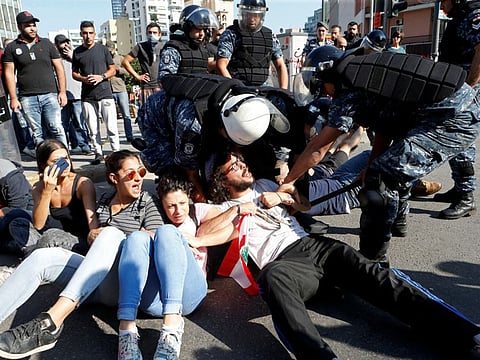Lebanon struggles to reopen roads as sit-ins continue
Protests continue around the country demanding the resignation of more politicians

Beirut: Lebanese security forces are still struggling to open some roads as protesters continue their civil disobedience in support of nationwide anti-government protests.
Authorities said schools would reopen on Thursday, but late the night before many parents received text messages saying their schools would remain closed for security reasons. The state-run National News Agency reported that some schools would remain closed until further notice.
Banks, schools and many businesses have been shuttered since mass protests erupted on Oct. 17. The protests were ignited by a proposed tax on the WhatsApp messenger service but rapidly escalated into calls for the resignation of the government and sweeping political change.
Banks are set to reopen Friday, amid concerns the severe fiscal crisis that preceded the protests could worsen.
Caretaker cabinet
President Michel Aoun has formally asked the cabinet to continue in a caretaker role until a new one is formed, as required by Lebanon’s system of government.
Hariri’s feuding government had sought last week to defuse popular anger at political leaders blamed for pushing the country towards economic collapse.
The government announced a series of reform plans, but with no concrete steps, it failed to placate protesters or reassure multilateral lenders enough to release billions in badly needed aid they had pledged.
A senior official familiar with Hariri’s thinking said he was ready to return as premier of a new Lebanese government on condition it includes technocrats and can quickly implement reforms to stave off economic collapse.
Hundreds streamed into a protest square in the nearby city of Tripoli, demanding the resignation of the rest of the political class.
In the southern city of Sidon, three people were injured in scuffles between the army and demonstrators, NNA said.
The unprecedented mobilisation has swelled into a popular drive to remove a political elite which has remained largely unchanged since the end of the civil war three decades ago.
Euphoric protesters experiencing a rare moment of national unity have pilloried politicians of all parties, calling for better public services, an end to rampant corruption and a complete overhaul of Lebanon’s sectarian-based politics.
When a sombre Hariri appeared on television to announce his resignation, crowds erupted into celebrations across the country but warned that the government’s fall was only one of their demands.
Hariri’s resignation came after counter-demonstrators loyal to some of his political rivals attacked the main protest site in the capital’s Martyr’s Square.
They destroyed tents and marquees and the rest of the temporary infrastructure that turned downtown Beirut into a huge encampment — hosting protests and political meetings by day, concerts and parties by night.
Well-organised protesters, however, swiftly cleaned up and returned to the site, occupying the main flyover again on Wednesday evening.
What’s next?
Forming a government in Lebanon can typically take months, with every sectarian and party leader seeking to protect their own communal interests.
“There is no time for any of the old games,” Heiko Wimmen, Lebanon project director at the International Crisis Group think-tank, told AFP.
“The pressure of the street and, perhaps even more so, the fear of economic collapse will dictate an accelerated government formation,” he said.
The 49-year-old Hariri, who had already stepped down twice as prime minister in 10 years, could yet return as the head of the next government.



